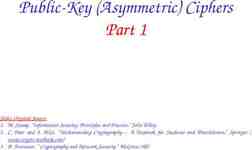Chapter 8: DHCP CCNA Routing and Switching Routing and Switching
43 Slides5.64 MB

Chapter 8: DHCP CCNA Routing and Switching Routing and Switching Essentials v6.0

Chapter 8 - Sections & Objectives 8.1 DHCPv4 Implement DHCPv4 to operate across multiple LANs in a small to medium-sized business network. Explain how DHCPv4 operates in a small- to medium-sized business network. Configure a router as a DHCPv4 server. Configure a router as a DHCPv4 client. Troubleshoot a DHCP configuration for IPv4 in a switched network. 8.2 DHCPv6 Implement DHCPv6 to operate across multiple LANs in a small to medium-sized business network. Explain the operation of DHCPv6. Configure stateless DHCPv6 for a small to medium-sized business. Configure stateful DHCPv6 for a small to medium-sized business. Troubleshoot a DHCP configuration for IPv6 in a switched network. 2016 Cisco and/or its affiliates. All rights reserved. Cisco Confidential 2

8.1 DHCPv4 2016 Cisco and/or its affiliates. All rights reserved. Cisco Confidential 3

DHCPv4 Operation Introducing DHCPv4 DHCPv4 assigns IPv4 addresses and other network configuration information dynamically. A dedicated DHCPv4 server is scalable and relatively easy to manage. A Cisco router can be configured to provide DHCPv4 services in a small network. 2016 Cisco and/or its affiliates. All rights reserved. Cisco Confidential 4

DHCPv4 Operation DHCPv4 Operation Four step process for a client to obtain a lease: 1. DHCP Discover (DHCPDISCOVER) client uses Layer 2 and Layer 3 broadcast addresses to find a DHCP server. 2. DHCP Offer (DHCPOFFER) - DHCPv4 server sends the binding DHCPOFFER message to the requesting client as a unicast. 3. DHCP Request (DHCPREQUEST) – the client sends back a broadcast DHCPREQUEST in response to the servers offer. 4. DHCP Acknowledgment (DHCPACK) – the server replies with a unicast DHCPACK message. 2016 Cisco and/or its affiliates. All rights reserved. Cisco Confidential 5

DHCPv4 Operation DHCPv4 Message Format DHCPv4 messages: If sent from the client, use UDP source port 68 and destination port 67. If sent from the server, use UDP source port 67 and destination port 68. Format and fields of a DHCPv4 Message 2016 Cisco and/or its affiliates. All rights reserved. Cisco Confidential 6

DHCPv4 Operation DHCPv4 Discover and Offer Messages 2016 Cisco and/or its affiliates. All rights reserved. Cisco Confidential 7

Configuring a Basic DHCPv4 Server Configuring a Basic DHCPv4 Server Configuring a Cisco router as a DHCPv4 server: Excluding IPv4 Addresses – ip dhcp excluded-address can exclude a single address or a range of addresses from being assigned. Configuring a DHCPv4 Pool - ip dhcp pool pool-name command creates a pool with the specified name and puts the router in DHCPv4 configuration mode. Address pool assigned using network command. Default gateway assigned using default-router command. Other commands are optional. 2016 Cisco and/or its affiliates. All rights reserved. Cisco Confidential 8

Configuring a Basic DHCPv4 Server Verifying DHCPv4 Verify DHCPv4 configuration using the show running-config section dhcp command. Verify the operation of DHCPv4 using the show ip dhcp binding command. Verify that messages are being received or sent by the router using the show ip dhcp server statistics command. 2016 Cisco and/or its affiliates. All rights reserved. Cisco Confidential 9

Configuring a Basic DHCPv4 Server DHCPv4 Relay DHCPDISCOVER messages are sent as broadcast messages. Routers do not forward broadcasts. A Cisco IOS helper address is configured so that the router acts as a relay agent forwarding the message to the DHCPv4 server. 2016 Cisco and/or its affiliates. All rights reserved. Cisco Confidential 10

Configuring a Basic DHCPv4 Server Lab - Configuring Basic DHCPv4 on a Router 2016 Cisco and/or its affiliates. All rights reserved. Cisco Confidential 11

Configuring a Basic DHCPv4 Server Lab - Configuring Basic DHCPv4 on a Switch 2016 Cisco and/or its affiliates. All rights reserved. Cisco Confidential 12

Configuring DHCPv4 Client Configuring a Router as DHCPv4 Client Small office/home office (SOHO) and branch sites often have to be configured as DHCPv4 clients. Use the ip address dhcp interface configuration mode command. 2016 Cisco and/or its affiliates. All rights reserved. Cisco Confidential 13

Configuring DHCPv4 Client Configuring a Wireless Router as a DHCPv4 Client Wireless routers are set to receive IPv4 addressing information automatically from the ISP. 2016 Cisco and/or its affiliates. All rights reserved. Cisco Confidential 14

Configuring DHCPv4 Client Packet Tracer - Configuring DHCPv4 Using Cisco IOS 2016 Cisco and/or its affiliates. All rights reserved. Cisco Confidential 15

Troubleshoot DHCPv4 Troubleshooting Tasks 2016 Cisco and/or its affiliates. All rights reserved. Cisco Confidential 16

Troubleshoot DHCPv4 Verify Router DHCPv4 Configuration Verify DHCPv4 Relay - use show running-config command to verify that the ip helper address is configured. Verify DHCPv4 configuration - use the show runningconfig include no service dhcp command to verify dhcp is enabled because there is no match for the no service dhcp. 2016 Cisco and/or its affiliates. All rights reserved. Cisco Confidential 17

Troubleshoot DHCPv4 Debugging DHCPv4 The extended ACL is used with the debug ip packet command to display only DHCPv4 messages. Another troubleshooting command is the debug ip dhcp server events. 2016 Cisco and/or its affiliates. All rights reserved. Cisco Confidential 18

Troubleshoot DHCPv4 Lab - Troubleshooting DHCPv4 2016 Cisco and/or its affiliates. All rights reserved. Cisco Confidential 19

8.2 DHCPv6 2016 Cisco and/or its affiliates. All rights reserved. Cisco Confidential 20

SLAAC and DHCPv6 Stateless Address Autoconfiguration (SLAAC) Two methods to dynamically assign IPv6 global unicast addresses: Stateless Address Autoconfiguration (SLAAC). Dynamic Host Configuration Protocol for IPv6 (Stateful DHCPv6). SLAAC uses ICMPv6 Router Solicitation and Router Advertisement messages to provide addressing and other configuration information. 2016 Cisco and/or its affiliates. All rights reserved. Cisco Confidential 21

SLAAC and DHCPv6 SLAAC Operation The router must have IPv6 routing enabled– ipv6 unicast-routing PC1 sends an RS message to the all-routers multicast address that it needs an RA. R1 responds with an RA message that has the prefix and prefix length of the network. PC1 uses this information to create its IPv6 global unicast address. It creates its interface id using EUI-64 or randomly generates it. PC1 must verify that the address is unique by sending an ICMPv6 Neighbor Solicitation message. 2016 Cisco and/or its affiliates. All rights reserved. Cisco Confidential 22

SLAAC and DHCPv6 SLAAC and DHCPv6 Different combinations of the Managed Address Configuration flag (M flag) and the Other Configuration flag (O flag) in the RA determine how the IPv6 address is assigned: SLAAC (Router Advertisement only) Stateless DHCPv6 (Router Advertisement and DHCPv6) Stateful DHCPv6 (DHCPv6 only) 2016 Cisco and/or its affiliates. All rights reserved. Cisco Confidential 23

SLAAC and DHCPv6 SLAAC Option SLAAC is the default on Cisco routers. Both the M flag and the O flag are set to 0 in the RA. This option instructs the client to use the information in the RA message only. 2016 Cisco and/or its affiliates. All rights reserved. Cisco Confidential 24

SLAAC and DHCPv6 Stateless DHCPv6 Option DHCPv6 is defined in RFC 3315. Stateless DHCPv6 option - client uses the RA message for addressing, additional parameters are obtained from DHCPv6 server. O flag is set to 1 and the M flag is left at the default setting of 0. Use command ipv6 nd other-configflag. 2016 Cisco and/or its affiliates. All rights reserved. Cisco Confidential 25

SLAAC and DHCPv6 Stateful DHCPv6 Option RA message informs the client not to use the information in the RA message. All addressing and configuration information must be obtained from a stateful DHCPv6 server. M flag is set to 1. Use the command ipv6 nd managedconfig-flag. 2016 Cisco and/or its affiliates. All rights reserved. Cisco Confidential 26

SLAAC and DHCPv6 DHCPv6 Operations DHCPv6 messages from server to client use UDP port 546. Client to server use UDP port 547. Client sends a DHCPv6 SOLICIT message using FF02::1:2. DHCPv6 server responds with a DHCPv6 ADVERTISE unicast message. Stateless DHCPv6 client - Generates its own address. Sends a DHCPv6 INFORMATIONREQUEST to the DHCPv6 server requesting only configuration parameters. Stateful DHCPv6 client - Sends a DHCPv6 REQUEST message to server for an IPv6 address and all other configuration parameters. 2016 Cisco and/or its affiliates. All rights reserved. Cisco Confidential 27

Stateless DHCPv6 Configuring a Router as a Stateless DHCPv6 Server Step 1 – Enable IPv6 routing. ipv6 unicast-routing Step 2 – Configure a DHCPv6 pool. ipv6 dhcp pool pool-name Step 3 – Configure pool parameters. dns-server server-address Step 4 – Configure the DHCPv6 interface ipv6 dhcp server pool-name 2016 Cisco and/or its affiliates. All rights reserved. Cisco Confidential 28

Stateless DHCPv6 Configuring a Router as a Stateless DHCPv6 Client Step 1 – IPv6 enabled on interface ipv6 enable Step 2 – enable automatic configuration of IPv6 addressing ipv6 address autoconfig 2016 Cisco and/or its affiliates. All rights reserved. Cisco Confidential 29

Stateless DHCPv6 Verifying Stateless DHCPv6 Commands to verify Stateless DHCPv6: show ipv6 dhcp pool show running-config show ipv6 interface debug ipv6 dhcp detail 2016 Cisco and/or its affiliates. All rights reserved. Cisco Confidential 30

Stateful DHCPv6 Server Configuring a Router as a Stateful DHCPv6 Server Step 1 – Enable IPv6 Routing. ipv6 unicast routing Step 2 – Configure a DHCPv6 pool. ipv6 dhcp pool pool-name Step 3 – Configure pool parameters: address prefix prefix/length dns-server dns-server-address domain-name domain-name Step 4 - Configure DHCPv6 interface: ipv6 dhcp server pool-name ipv6 nd managed-config-flag 2016 Cisco and/or its affiliates. All rights reserved. Cisco Confidential 31

Stateful DHCPv6 Server Configuring a Router as a Stateful DHCPv6 Client Step 1 – Allow the router to send RS messages and participate in DHCPv6. ipv6 enable Step 2 – Make the router a DHCPv6 client. ipv6 address dhcp 2016 Cisco and/or its affiliates. All rights reserved. Cisco Confidential 32

Stateful DHCPv6 Server Verifying Stateful DHCPv6 Use the following commands to verify Stateful DHCPv6: show ipv6 dhcp pool show ipv6 dhcp binding show ipv6 interface 2016 Cisco and/or its affiliates. All rights reserved. Cisco Confidential 33

Stateful DHCPv6 Server Configuring a Router as a DHCPv6 Relay Agent If the DHCPv6 server is located on a different network than the client, the router can be configured as a DHCPv6 relay agent. ipv6 dhcp relay destination destination-address 2016 Cisco and/or its affiliates. All rights reserved. Cisco Confidential 34

Stateful DHCPv6 Server Lab - Configuring Stateless and Stateful DHCPv6 2016 Cisco and/or its affiliates. All rights reserved. Cisco Confidential 35

Troubleshoot DHCPv6 Troubleshooting Tasks 2016 Cisco and/or its affiliates. All rights reserved. Cisco Confidential 36

Troubleshoot DHCPv6 Verify Router DHCPv6 Configuration Use the show ipv6 interface command to verify DHCPv6 configuration. 2016 Cisco and/or its affiliates. All rights reserved. Cisco Confidential 37

Troubleshoot DHCPv6 Debugging DHCPv6 To verify the receipt and transmission of DHCPv6 messages: debug ipv6 dhcp detail 2016 Cisco and/or its affiliates. All rights reserved. Cisco Confidential 38

Troubleshoot DHCPv6 Lab - Troubleshooting DHCPv6 2016 Cisco and/or its affiliates. All rights reserved. Cisco Confidential 39

8.3 Chapter Summary 2016 Cisco and/or its affiliates. All rights reserved. Cisco Confidential 40

Conclusion Packet Tracer - Skills Integration Challenge 2016 Cisco and/or its affiliates. All rights reserved. Cisco Confidential 41

Conclusion Chapter 8: DHCP Implement DHCPv4 to operate across multiple LANs in a small to medium-sized business network. Implement DHCPv6 to operate across multiple LANs in a small to medium-sized business network. 2016 Cisco and/or its affiliates. All rights reserved. Cisco Confidential 42







